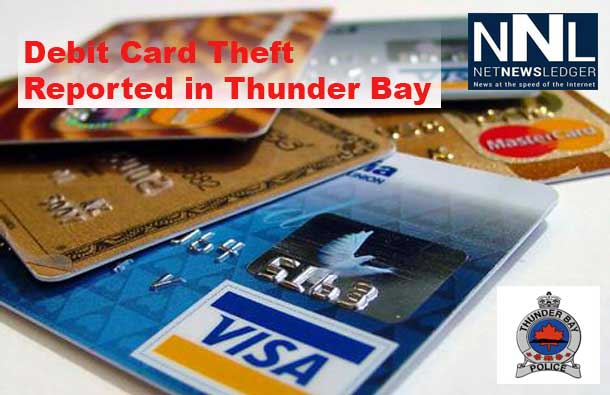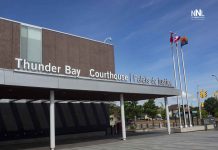
THUNDER BAY – News – Thunder Bay Police have provided an update on an incident that started last weekend with people having large amounts of money removed from their debit cards. Police are reporting that they believe the incident was caused by a compromised electronic banking instrument which likely had been installed in the city at some time last summer.
The CIBC state, “Debit Card Fraud occurs when the information contained on your debit card is stolen and used to obtain funds from your account without your authorization. Card reading devices are used to obtain the electronic data from the magnetic stripe on your card, and hidden cameras or false Personal Identification Number (PIN) pads are used to obtain your personal access code. That’s why it is imperative that you protect your PIN.”
Thunder Bay Police state that they have received 77 reports of fraudulent withdrawls made from local bank accounts, The customers appear to have been from all the various financial institutions in the city.
However those numbers may be far higher. Copperfin Credit Union has reported that there are over one hundred customers who have found fraudulent withdrawals from their accounts.
The point of compromise is not yet known. It is likely that a comprised electronic banking instrument had been installed somewhere in the city at some point in the past year. This allowed for debit card information, including PIN number to be captured. Usually once the information has been captured it will be held for several months and then used on mass to make withdrawals from a large city. In this particular case, the withdrawals were made in New York.
Local banks and credit unions have been working with affected customers to assist with the financial loss from accounts. Anyone who has been affected is asked to contact their bank or credit union to make a report. Customers will be directed to make a police report if necessary.
The reality is that the banks and credit unions are the eventual victim of this situation as they will be ultimately at a financial loss. Police will continue to work with the investigators from the various financial institutions in an attempt to determine the point of compromise.
Protecting Yourself from Debit Card Fraud
Report it
- Step 1
If you are a victim of debit card fraud, you should contact your bank immediately and they will take the appropriate steps to protect you. For example, they may block your card to prevent losses, ask you to change your PIN or cancel your card then issue you a new one. Depending on the circumstances, the bank may also ask you to sign an affidavit if there are fraudulent transactions in your account. If there is money missing from your account, they will work to get it back as quickly as possible, usually within two or three days or sometimes before you even know it’s gone. - Step 2 – Contact your credit bureau and have fraud alerts placed on your credit reports:
- Equifax Canada
Toll free: 1 800 465-7166 - TransUnion Canada
Toll free: 1 877 525-3823
- Equifax Canada
- Step 3 – Contact your local police
- Step 4 – Always report debit card fraud to the Canadian Anti-Fraud Centre by visiting their website or calling 1-888-495-8501.
Stop it
Your debit card is the key to your account(s) – it’s for your personal use only. Follow these tips to protect your debit cards against fraud and misuse.
- Keep your card in a safe place and never lend it to anyone. Conducting an Automatic Banking Machine (ABM) or debit transaction requires both your card and your Personal Identification Number (PIN).
- Protect your PIN – it’s your electronic signature. Don’t write it down – memorize it. Change it periodically.
- When selecting a PIN, always avoid the obvious: your name, telephone number, date of birth, and address. Make sure your PIN cannot be easily guessed if your debit card is lost or stolen.
- Never disclose your PIN to anyone. No one from a legitimate financial institution, police service, or business should ask for your PIN.
- Always conduct your ABM transactions when and where you feel most secure. If you are uncomfortable about using the machine for any reason, do it later or go to another location. If anything seems unusual about the ABM or point of sale terminal, don’t use it – report the situation to police, the merchant or your financial institution.
- To ensure privacy, use your hand or body as a shield to prevent others from seeing you enter your PIN.
- After completing a transaction, remember to take your card and your transaction record.
- After making a withdrawal from an ABM, count the cash received and put it away immediately.
- If your card is lost, stolen, or is retained by an ABM, notify your financial institution immediately. Most institutions offer 1-800 telephone numbers and/or 24-hour service for lost or stolen cards.
- Regularly review transaction history online or your monthly bank statements and report anything unusual to your financial institution immediately.
- Robbery rarely occurs at ABMs, but if it does happen, remember that your safety comes first: Cooperate with the robber and then report the incident to the police and your bank.
- Beware of all e-mail messages claiming to be from your financial institution. Canadian financial institutions do not send e-mails to their customers asking them to provide account information. In many reported cases of fraud, individuals will receive e-mail from what appears to be their bank asking them to click on a link included in the message. If you click on the link, you are brought to a fraudulent web site that looks just like your bank’s website. This practice is known as phising. When you enter personal information such as your credit card number and expiry date on a phishing site, it’s sent directly to the perpetrators of the fraud. For more information on phishing, visit the RCMP web page.










